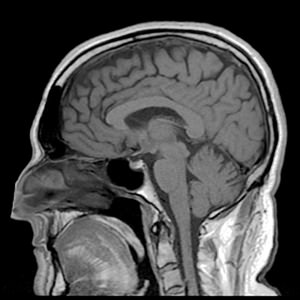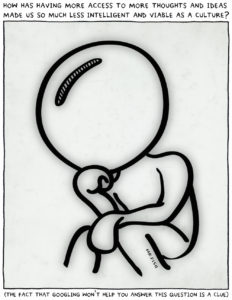Too Much Intelligence Can Be Bad for You
It is possible that, like all things good and bad, an overabundance of cleverness can produce negative outcomes in a person's day to day life, philosopher and writer Julian Baggini argues.
It is possible that, like all things good and bad, an overabundance of cleverness can produce negative outcomes in a person’s day to day life, philosopher and writer Julian Baggini argues. You can, for example, think yourself out of something by using the most complex solution rather than the simplest since that is what your mind is able to comprehend. Or, as in the case of one of Baggini’s friends, you can use your reasoning skills to rationalize paranoias to an extreme. And although, the author acknowledges, it’s probably better to have too much brainpower than too little, he writes that one of the problems that causes this excess is the way intelligence is defined.
The Guardian:
You could, of course, say that intelligence, properly understood, is a combination of wisdom, good judgment, logical dexterity and factual knowledge, and by definition you can’t have too much of that. I’d like to agree, but I fear it is already too late to reclaim the word “intelligence” for this well-rounded cognitive amalgam. Intelligence has been broken down into small parts, and we can rely on each one to excess.
It started with IQ, which measures what we might call the processing power of the brain. In reaction to this, people started to claim all sorts of abilities IQ left out as forms of intelligence. Howard Gardner led this multiple intelligences movement, which has generated the somewhat useful concept of emotional intelligence (EQ), as well as the more dubious spiritual and environmental varieties.
Strange though it may seem, you can have too much emotional intelligence. Consider the person who has a very heightened ability to understand the mental states of others, but uses this to manipulate or deceive them. Or the engineer who relies too much on her ability to judge people’s characters and not enough on their technical competence.
There is one other way in which we can have too much intelligence. We kid ourselves if we think that the highest form of human life is one which leaves our brutish nature behind and devotes itself entirely to matters intellectual. Our brains are incredible things, for sure, but without the motivations, desires and preferences generated by our animal natures, they would have nothing to do. At this time of the year, for example, we celebrate good food, good drink, good friends, and family – good or otherwise. From a purely rational point of view, none of these things would have any value, because reason alone distinguishes only true and false, not good and bad, better or worse.
In other words, if you are to subscribe to Baggini’s line of thought, a balance of insights is key to a healthy existence. And yet, who’s to say the author isn’t a tad guilty of over-thinking intelligence himself?
—Posted by Natasha Hakimi
Your support matters…Independent journalism is under threat and overshadowed by heavily funded mainstream media.
You can help level the playing field. Become a member.
Your tax-deductible contribution keeps us digging beneath the headlines to give you thought-provoking, investigative reporting and analysis that unearths what's really happening- without compromise.
Give today to support our courageous, independent journalists.





You need to be a supporter to comment.
There are currently no responses to this article.
Be the first to respond.